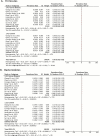The gut microbiota and its role in Graves' Disease: a systematic review and meta-analysis
- PMID: 39364132
- PMCID: PMC11444861
- DOI: 10.12938/bmfh.2024-020
The gut microbiota and its role in Graves' Disease: a systematic review and meta-analysis
Abstract
Emerging research indicates the potential involvement of gut bacteria in the etiology of Graves' Disease (GD). However, the evidence regarding this matter is still conflicting. The primary objective of this investigation was to examine the correlation between gut microbiota and GD. A comprehensive search was conducted of the Cochrane Library, Scopus, Europe PMC, and Medline databases up until August 1, 2023, utilizing a combination of relevant keywords. This review incorporates literature that examined the composition of gut microbiota in patients with GD. We employed random-effect models to analyze the standardized mean difference (SMD) and present the outcomes together with their corresponding 95% confidence intervals (CIs). A total of ten studies were incorporated. The results of our meta-analysis indicated that patients with GD have a reduced alpha diversity of gut microbiota as evidence by a significant reduction of Chao1 (std. mean difference -0.58; 95% CI -0.90, -0.26, p=0.0004; I2 =61%), ACE (std. mean difference -0.64; 95% CI -1.09, -0.18, p=0.006; I2 =77%), and Shannon index (std. mean difference -0.71; 95% CI -1.25, -0.17, p=0.01; I2 =90%) when compared with healthy controls. At the phylum level, the abundance of Firmicutes was reduced in GD patients, while that of Bacteroidetes was increased. This study suggests a notable decrease in the richness and variety of gut microbiota among people diagnosed with GD in comparison with healthy controls.
Keywords: Graves’ Disease; autoimmune thyroid disease; endocrinology; gut microbiome; microbiology.
©2024 BMFH Press.
Conflict of interest statement
The authors report there are no competing interests to declare.
Figures



Similar articles
-
Alterations of Gut Microbiota in Patients With Graves' Disease.Front Cell Infect Microbiol. 2021 May 5;11:663131. doi: 10.3389/fcimb.2021.663131. eCollection 2021. Front Cell Infect Microbiol. 2021. PMID: 34026662 Free PMC article.
-
Gut microbiota dysbiosis in ankylosing spondylitis: a systematic review and meta-analysis.Front Cell Infect Microbiol. 2024 Oct 1;14:1376525. doi: 10.3389/fcimb.2024.1376525. eCollection 2024. Front Cell Infect Microbiol. 2024. PMID: 39421642 Free PMC article.
-
Association Between Gut Microbiota and Autoimmune Thyroid Disease: A Systematic Review and Meta-Analysis.Front Endocrinol (Lausanne). 2021 Nov 17;12:774362. doi: 10.3389/fendo.2021.774362. eCollection 2021. Front Endocrinol (Lausanne). 2021. PMID: 34867823 Free PMC article.
-
Modulating gut microbiota in a mouse model of Graves' orbitopathy and its impact on induced disease.Microbiome. 2021 Feb 16;9(1):45. doi: 10.1186/s40168-020-00952-4. Microbiome. 2021. PMID: 33593429 Free PMC article.
-
Significance of Gut Microbiota on Graves' Disease.Int J Gen Med. 2024 Sep 11;17:3967-3974. doi: 10.2147/IJGM.S467888. eCollection 2024. Int J Gen Med. 2024. PMID: 39281039 Free PMC article. Review.
References
-
- Davies TF, Andersen S, Latif R, Nagayama Y, Barbesino G, Brito M, Eckstein AK, Stagnaro-Green A, Kahaly GJ. 2020. Graves’ disease. Nat Rev Dis Primers 6: 52. - PubMed
-
- Smith TJ, Hegedüs L. 2016. Graves’ disease. N Engl J Med 375: 1552–1565. - PubMed
-
- Zimmermann MB, Boelaert K. 2015. Iodine deficiency and thyroid disorders. Lancet Diabetes Endocrinol 3: 286–295. - PubMed
-
- Okosieme OE, Taylor PN, Evans C, Thayer D, Chai A, Khan I, Draman MS, Tennant B, Geen J, Sayers A, et al. 2019. Primary therapy of Graves’ disease and cardiovascular morbidity and mortality: a linked-record cohort study. Lancet Diabetes Endocrinol 7: 278–287. - PubMed
Publication types
LinkOut - more resources
Full Text Sources
Research Materials
Miscellaneous

